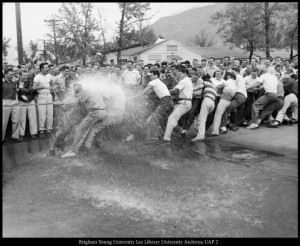There was a time when women couldn’t wear jeans to school and there was no online library databases to rely on when writing a paper.
Many BYU professors can pull out a yearbook and talk about the differences between their experiences as undergraduates years ago and their experiences as teachers at their alma mater.
Craig Harline, a member of the history department, discussed the social differences he noticed from his undergraduate years.

The dress and grooming standards have been part of BYU’s honor code for years, but just as styles and trends change over generations, so do the interpretations of the standards.
“The big concern for guys was long hair, because nobody wore short hair,” Harline said. “I think (the standard) was the same, but interpreted differently. I think there was a time in the 80’s when ‘cover the ear’ meant all the way cover.”
Harline went on to note that today, the standard is interpreted to mean any concealment of the ear.
Eric Hyer, from the political science department, noticed changes in the caliber of students accepted to BYU.
“I think I can say I wouldn’t be able to get into BYU today, given my high school record,” Hyer joked. “The quality of students (has) improved so much from what I remember when I was a student here.”
Hyer also discussed the technological shift since his time as an undergraduate.
“In terms of being a student, the most dramatic change in my life since being an undergraduate is if you could get your hands on an IBM Selectric typewriter that could self-correct — that was cool,” Hyer said.
The changes in technology over the years have changed the very method of teaching at the university level.
“The emphasis has shifted to theory and methods, and how to do research,” Hyre said. “Now we know how to access information online, but the challenge is that since there is such a wealth of information available, how do we train students to be savvy users of that information?”
Jared Ludlow, a professor of ancient scripture, sees the shift in technology as both a convenience and a hindrance to learning.
“It cuts both ways,” Ludlow said. “On the one hand, students have access to so much more information, so they should be able to find out about pretty much anything and access it. On the other hand, I think it has taken away some of the hard work of discovery and of working carefully and meticulously through things.”
One of the changes students can be especially excited about is the increase in national and international recognition BYU has received. Hyer discussed how the success of the students at prestigious graduate universities and in their respective fields has given BYU the reputation of being a high-quality institution.
“Graduating from BYU means something different than it used to mean,” Hyer said.




